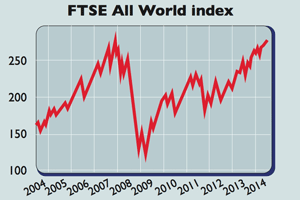Global stocks hit new peaks
Global stocks have hit new highs with American and European stock markets leading the way.

Get the latest financial news, insights and expert analysis from our award-winning MoneyWeek team, to help you understand what really matters when it comes to your finances.
You are now subscribed
Your newsletter sign-up was successful
Want to add more newsletters?
"The bull [is] in full snorting mode," says Vito Racanelli in Barron's. Global stocks, as measured by the FTSE All World index, hit a new record this week. In the US, the S&P 500 hit a new peak of around 1,900, while the Dow Jones index ploughed ahead to the 17,000 level. Meanwhile, in Europe, stocks have hit a new six-year high.
The latest surge came as the US employment situation continued to improve (see chart below), while GDP growth in Japan was unexpectedly strong. Investors also started to pencil in a move to full-blown money printing in the eurozone, after European Central Bank boss Mario Draghi took a range of measures to head off deflation.
But despite signs of recovery, markets also expect central banks to keep monetary policy fairly loose. Although the US economy "is going to be getting a bit better... we're not going to have runaway growth", says Robert Doll of Nuveen Asset Management.
Try 6 free issues of MoneyWeek today
Get unparalleled financial insight, analysis and expert opinion you can profit from.

Sign up to Money Morning
Don't miss the latest investment and personal finances news, market analysis, plus money-saving tips with our free twice-daily newsletter
Don't miss the latest investment and personal finances news, market analysis, plus money-saving tips with our free twice-daily newsletter
So the Federal Reserve will not be forced to wind down its quantitative easing (QE), or money-printing programme, any faster than expected. So the pattern of the past few years endures: growth is returning, but it is still shaky enough to warrant easy money from central banks.
And any future weakness would, investors assume, be met by the central bank "turning up the dial on the funny-money machine, and thus stock prices, anew", says Liam Halligan in The Sunday Telegraph.

The question is how much longer this game can continue. As we've noted a number of times, equity prices and valuations have raced ahead of earnings on both sides of the Atlantic. But markets can detach themselves from the fundamentals for several years before they "collapse under their own weight", says Fidelity's Tom Stevenson.
With the Fed still printing, Japan's central bank prepared to do more, and QE apparently in the offing in Europe, there is still plenty of easy money potentially in the pipeline. Bears and short-sellers should beware: as John Maynard Keynes said, "markets can remain irrational longer than you can remain solvent".
Get the latest financial news, insights and expert analysis from our award-winning MoneyWeek team, to help you understand what really matters when it comes to your finances.

-
 Financial education: how to teach children about money
Financial education: how to teach children about moneyFinancial education was added to the national curriculum more than a decade ago, but it doesn’t seem to have done much good. It’s time to take back control
-
 Investing in Taiwan: profit from the rise of Asia’s Silicon Valley
Investing in Taiwan: profit from the rise of Asia’s Silicon ValleyTaiwan has become a technology manufacturing powerhouse. Smart investors should buy in now, says Matthew Partridge